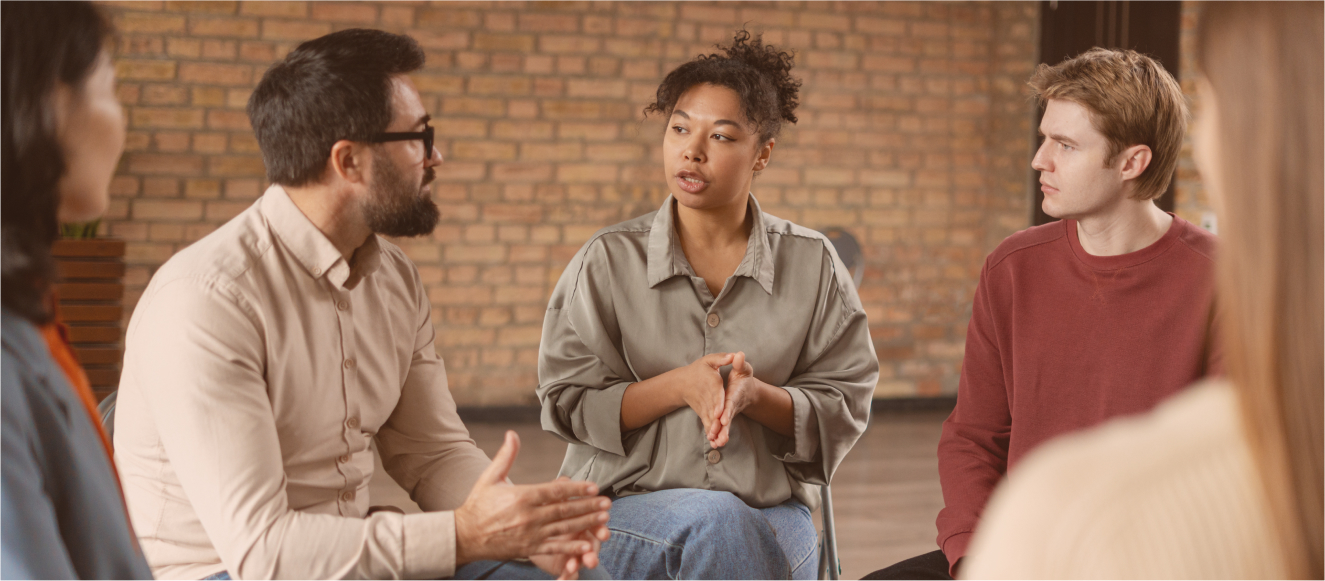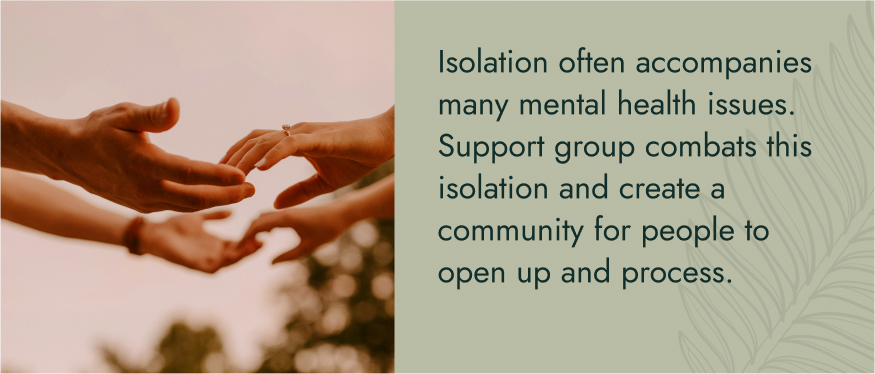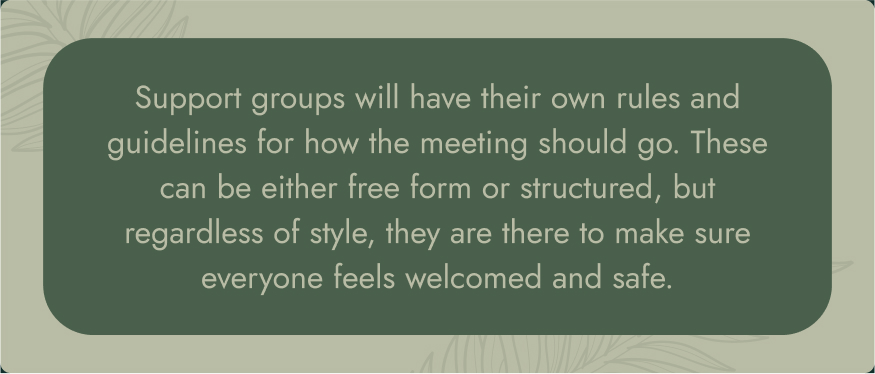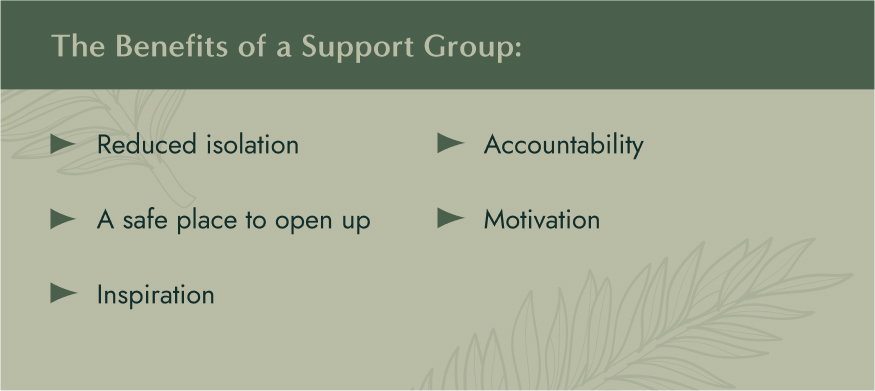Support Groups
Chances are you’re not alone in your mental health struggle. There are groups across the country that meet to talk about, process, and live out their mental health recovery journey.



Mental health struggles are personal. No one else knows exactly what you’re going through, and that can feel isolating. However, you’re not alone. There are groups across the country that meet to talk about, process, and live out their mental health recovery journey.
In this resource, we’ll cover everything there is to know about support groups, including:
- What they are
- What to expect
- Why they’re successful
What Is A Support Group?
Support groups are designed to bring people who are experiencing a similar struggle. These groups can address any number of topics, including:
- Life with a chronic condition
- Substance use disorder
- Behavioral addictions
- Attachment styles
- Grief support
These support groups are not considered therapy, but they are an opportunity for people to become more comfortable opening up about their struggles. It’s about finding a community of people who are in a similar situation and building connections.
Mental health struggles can be isolating, but support groups give people the chance to gain support from their peers.

Group Therapy and Community Support Groups in Mesa, AZ
Get the support you need at Sequoia Behavioral Health. Our outpatient treatment center hosts not just group therapy for our clients, but support groups that the Mesa community is welcome to join. Learn more about group therapy and what might look like.

What Happens in a Support Group Meeting?
Entering a new community or group is daunting. It’s a challenging thing to walk into a support group without knowing anything about it.
Here’s what you should know about support groups before you attend your first meeting.
Ground Rules
Meetings have a structure to them and rules that members have to follow to participate. Rules for meetings might change between groups, but they follow similar guidelines. Most groups have rules to the effect of:
- Absolute confidentiality
- Respect
- Don’t monopolize the time: Spending the entire time on you
- Only talk when it’s your turn: No cross-talk
- No talking about other people’s experiences during your sharing time
These rules are intended to keep meetings in the here and now and are guideposts for ensuring everyone feels heard.

Introduction or Preamble
Some meetings start with someone reading the tenets of the group. This could include the 12 steps or 12 traditions. During this time, statements about spirituality may be shared.
It’s important to know that many support groups are spiritual, but not religious. Members may share their beliefs about a higher power, but this is not a requirement.
Many organizations have writings that mention a higher power, god, or a spiritual being. The definition of what that means is up to each member, but it’s not something you need to engage with. A support group shouldn’t pressure spiritual beliefs or religious practices. Instead, it’s a place where thoughts can be shared freely.
Story Telling
The bulk of the meeting time is dedicated to sharing personal experiences. Depending on the format of the group, this could either be free-form or more structured.
During this time, people will share current issues and anything else happening in their lives. It’s a time for people to open up about their experiences and express themselves to the group.
It’s important to note that sharing is not required. If you don’t want to talk, you don’t have to.
Guidance From a Counselor
Every support group should have a mediator or counselor. It’s their job to make people feel at ease while sharing and giving guidance where appropriate.
It’s not their job to act as a therapist, but instead to guide the discussion for the group. If things start to get off-topic, they might lead people back to the topic at hand. They may also assign homework for the next meeting and provide exercises you can try at home.
Ready to Join?
Sequoia Behavioral Health hosts support groups 1-2 times a week. These meetings are for outpatient clients, alumni, and the community of the Phoenix, Arizona area. These intimate 15-20 person meetings are focused on general mental health, Alcoholics Anonymous (AA), and Codependent Anonymous (CoDA).
If you’re in Mesa or the greater Phoenix area and are struggling with your mental health. Come join a group that wants to see you feel better and succeed.
Why are Support Groups Helpful?
Support groups are often portrayed as boring meetings of people sitting in a dark room. The truth is, support groups are incredibly effective for recovery and improving overall mental health.

Reduces Isolation
Struggling with a mental health condition alone is isolating. You may feel like you’re the only one who has experienced what you’re dealing with or like no one can help you.
Support groups give a broader perspective of what you’re going through by connecting you with other people who share a similar experience. Finding a sense of community and fellowship can improve the likelihood of successful treatment.
A Safe Place to Open Up
Opening up about your struggles is helpful for processing and getting treatment. Support groups provide members with a safe place to open up and start talking about personal struggles.
Most groups are led by a counselor who has experienced the same or a similar issue. They are there to facilitate the conversation, but the meeting is mostly comprised of members sharing their experiences.
Inspiration, Accountability, and Encouragement
Some days are harder than others. Processing and recovering from a mental health struggle is hard, and some days you might not feel like:
- Fighting off cravings
- Regulating your emotions
- Reframe your thinking
When you join a support group, you’ll find inspiration and encouragement to continue seeking treatment and pursuing the change you want to see.
You’ll also receive a level of accountability. Group members will expect to hear updates at meetings, and they want to see you succeed. Knowing there’s a group of people rooting for you will help keep you accountable and motivated.
Related Blogs

Individual Therapy vs Group Therapy:
Both individual and group therapy are integral parts of holistic mental health treatment. Learn more about how and where they help.

Life After Addiction: How to Navigate Life After Rehab
Reintegrating into daily life after rehab is challenging. Discover how to continue the healing journey and maintain recovery after rehab.

How to Avoid Toxic Positivity
There’s a fine line between encouraging someone and dismissing their feelings. Learn how positivity can be toxic and how to avoid it.
Support Groups in Mesa, Arizona
We offer support groups once to twice a week for the Mesa, Arizona community, SBH Alumni, and our clients. These groups are safe places for people to share their experiences as they relate to general mental health, substance abuse, and codependency.
Get more information about our support groups by contacting us. We’d love to provide you with support for whatever it is you’re going through.
Learn More
Experiential Therapy
Connecting the mind and body through different physical experiences can help with healing. Experiential therapy can involve acting, painting, writing, and more.
Recreational Therapy
Sequoia Behavioral Health offers Recreational Therapy which uses games, movement, art, nature, and other positive activities to aid the recovery process.
Group Therapy
In group therapy, individuals can learn, grow together, and experience meaningful support through psychoeducation, recreation, and community development.
Everyone deserves mental wellness. Whether you simply need support from peers or inpatient care, Sequoia can help. Learn about our different levels of mental health treatment programming.


